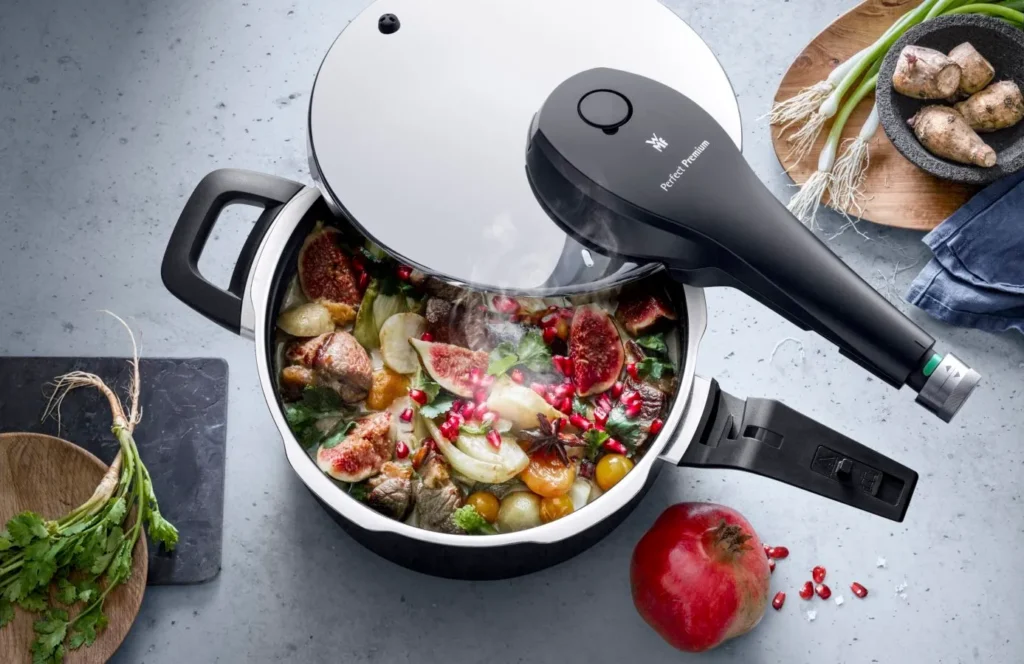
Table of Contents
Pressure cookers are smart appliances, that are in high demand in the kitchen, and spare a lot of time and effort, so cooking is not a troublesome process. However, not all foods are appropriate under such high temperatures as a part of the pressure cooker system. To get the most efficient outcomes and stay away from potential risks, below are the 7 foods that one must avoid while using a pressure cooker.
1. Dairy and Creamy Sauces:
At times, a pressure cooker may give undesirable outcomes if used for cooking dairy-based dishes or creamy sauces. At these high temperatures and pressures, these ingredients tend to curdle or separate, and in the case of vanilla cream, yield lumpy, undesirable textures. It is better to add dairy-added ingredients later – after the pressure cooking process is finished, for a smoother consistency.
2. Pasta and Noodles:
People who feel that it’s easier to boil noodles or pasta in a pressure cooker should fight the desire to do so. These types of food will usually become too waterlogged as the process happens in the intense pressure cooker environment. Go with their separate boiling process on the stove in order to keep them the way they duly naturally look and should not become a gooey mess.
Softer vegetables such as spinach, kale, and other green leaves are being cooked by less ruthless methods. Soggy Slices Slicing these vegetables and cooking them too quickly in a pressure cooker can easily damage the cell structure of these vegetables, leading to a mushy and unappetising texture. You can boil or saute your leafy greens, but not for overcooking.
4. Breaded Foods:
Those foods that are battered or dipped in breadcrumbs are not appropriate for pressure cookery; typically chicken fried or fried fish are such foods. In the fryer bag environment, however, the pressure cooker process cannot deliver the crispiness associated with traditional frying. Also, keep the breading for the oven and stovetop cooking if it is the rich task of crunching at dawn that you hope from on the chips.
5. Whole Grains and Rice Mixes:
Pressure cookers will sit up great in cooking rice yet it is wise to be careful when cooking rice combines or entire cereal grains with different preparing times. Although grains can be cooked to varying degrees, the uneven product leaves the plate nis a distinctly unsatisfactory result. When it comes to such mixes, you may well cook the grains separately and make the blends time subsequently.
6. Foods High in Fat:
Pressure cookers may be prone to initial problems when being used to cook meats that are too fatty or when oily foods are used. It is due to the combined effect of high pressure and the steam, which makes the fats separate, and as a result, greasy meals. When you are cooking a meal that involves fatty ingredients, fat trimming processes should be recommended before cooking or other cooking methods should be chosen that facilitate control of the fat component.
7. Thickening Agents:
refrain from the addition of thickening agents such as the flour, maize starch in the onset of pressure cookery. These can agglutinate in compression, which means that the consistency will be unevenly distributed whereby some parts of it will be lumpy. Thickening agents, commonly added after pressure cooking, are better controlled where the texture can be monitored and no unintended clot formation takes place.
Conclusion
In general, though pressure cookers are equipment tools that are very efficient, choosing the right foods ultimately determines the overall success and smooth sails that you may have to cook with while using a pressure cooker. If you ensure to avoid these seven types of foods in your cooker, you can maximize the benefits of this appliance, without sacrificing the essential tastes and textures of certain dishes. Of course, a few wise actions in the kitchen will make you a great culinary master
Global Health Challenges Such As HIV/AIDS, Malaria, and Tuberculosis
The health challenges don’t respect borders in our interdependent world. People around the world face deadly diseases such as HIV/ AIDS, malaria and TB. Fortunately, there is ongoing work to address these challenges, with a major focus on the provision of equal access to healthcare.
HEALWELLHUB
"Heal. Thrive. Unit





Leave a Reply